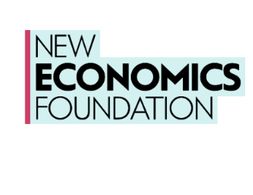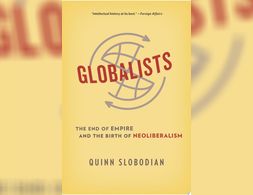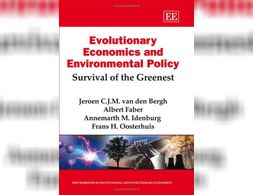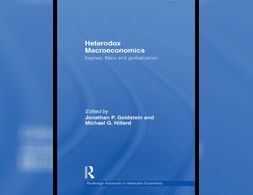✕
915 results
The new online platform ‚DIY Macroeconomic Model Simulation‘ provides an open-source code repository and online script for macroeconomic model simulation. It follows a “do-it-yourself” (DIY) approach, empowering users to numerically simulate key macroeconomic models on their own using the programming language R.
The policy briefing provides a data-rich overview over the budgets planned for public services in the UK and their connection to inflation expectations. It highlights the fact that inflation might lead to "invisible" cuts to public sector budgets.
In the first intellectual history of neoliberal globalism, Quinn Slobodian follows neoliberal thinkers from the Habsburg Empire’s fall to the creation of the World Trade Organization to show that neoliberalism emerged less to shrink government and abolish regulations than to deploy them globally to protect capitalism.
Financial Evolution at the Speed of Thought A new evolutionary explanation of markets and investor behaviorHalf of all Americans have money in the stock market yet economists can t agree on whether investors and markets are rational and efficient as modern financial theory assumes or irrational and inefficient as behavioral …
This book discusses the relationship between pluralist economics and the case study method of teaching, advocating the complimentary use of both to advance economics education. Using a multi-paradigmatic philosophical frame of analysis, the book discusses the philosophical, methodological, and practical aspects of the case study method while drawing comparisons with those of the more commonly used lecture method.
Financialization is one of the most innovative concepts to emerge in the field of political economy during the last three decades, although there is no agreement on what exactly it is. Profiting Without Producing by Costas Lapavitsas puts forth a distinctive view defining financialization in terms of the fundamental conduct of non-financial enterprises, banks and households.
Gender Development and Globalization is the leading primer on global feminist economics and development. Gender is a development issue because social considerations are not easily incorporated into institutions such as policies, regulations, markets and organizations. This process is often referred to as the mainstreaming of gender in development institutions.
This collection of videos offers a short introduction to ecological economics and its main differences with respect to environmental economics.
The goal of the class is to acquire familiarity with recently-published research in alternative macroeconomics with a focus on the distribution of income and wealth, cyclical growth models, and technical change.
This film looks at the role economic growth has had in bringing about this crisis, and explores alternatives to it, offering a vision of hope for the future and a better life for all within planetary boundaries.
This study offers a unique evolutionary economics perspective on energy and innovation policies in the wider context of the transition to sustainable development. The authors include: - an analysis of the environmental policy implications of evolutionary economics - a critical examination of current Dutch environmental and innovation policies and policy documents - systematic evaluation of three specific energy technologies, namely fuel cells, nuclear fusion and photovoltaic cells, within the evolutionary-economic framework.
This article by Rüdiger Bachmann et.al. discusses the economic effects of a potential cut-off of the German economy from Russian energy imports.
This Companion takes stock of the trajectory, achievements, shortcomings and prospects of Marxist political economy. It reflects the contributors' shared commitment to bringing the methods, theories and concepts of Marx himself to bear across a wide range of topics and perspectives, and it provides a testimony to the continuing purpose and vitality of Marxist political economy.
Heterodox Macroeconomics offers a detailed understanding of the foundations of the recent global financial crisis
That’s why it is time, says renegade economist Kate Raworth, to revise our economic thinking for the 21st century. In Doughnut Economics, she sets out seven key ways to fundamentally reframe our understanding of what economics is and does.
Heterodox Macroeconomics offers a detailed understanding of the foundations of the recent global financial crisis.
Transition from central planning to a market economy, involving large-scale institutional change and reforms at all levels, is often described as the greatest social science experiment in modern times.
Ecological economics addresses one of the fundamental flaws in conventional economics--its failure to consider biophysical and social reality in its analyses and equations. Ecological Economics: Principles and Applications is an introductory-level textbook that offers a pedagogically complete examination of this dynamic new field.
Microeconomics: A Critical Companion offers students a clear and concise exposition of mainstream microeconomics from a heterodox perspective.
The book is offered, in the first instance, to students who are beginners in economics, but some parts of it may be of wider interest.
The three topics, Economic Doctrines, Analysis and Modern Problems, might be the subject of concurrent courses or they may be studied consecutively.
Thinking in Systems, is a concise and crucial book offering insight for problem solving on scales ranging from the personal to the global. Edited by the Sustainability Institute's Diana Wright, this essential primer brings systems thinking out of the realm of computers and equations and into the tangible world, showing readers how to develop the systems-thinking skills that thought leaders across the globe consider critical for 21st-century life.
Philosophy of Economics: A Contemporary Introduction is the first systematic textbook in the philosophy of economics introduces to the epistemological, metaphysical and ethical problems that arise in economics, and presents detailed discussions of the solutions that have been offered.
This book offers the first systematic analysis of economic thought concerning war.
The book provides an excellent comparative perspective on New Keynesian "New Consensus" economics and Post-Keynesian Economics at a beginner level. It also offers an interactive tool to understand how the economic models work, especially from a heterodox / pluralist perspective.
Why is it that some countries become rich while others remain poor? Do markets require regulation to function efficiently? If markets offer an efficient way of exchanging goods, why do individuals even create firms?
This course is an introduction to macroeconomics with a specific focus on the euro area. The theoretical part provides a critical presentation of the two key macroeconomic models: the (neo)classical approach and the Keynesian approach. This allows a comparative analysis of important macroeconomic topics:
- unemployment
- inflation
- government debt and Modern Monetary Theory
- banks and financial crises.
The policy-oriented part discusses the monetary policy of the ECB and the specific challenges for fiscal policy in the euro area. The course also presents other euro area specific topics: Optimum currency area, euro crises, Next Generation EU and Green New Deal.
The dominant view of inflation holds that it is macroeconomic in origin and must always be tackled with macroeconomic tightening. In contrast, we argue that the US COVID-19 inflation is predominantly a sellers’ inflation that derives from microeconomic origins, namely the ability of firms with market power to hike prices.
To explain the pronounced instability of the world economy since the 1970s, the book offers an important and systematic theoretical examination of money and finance.
This course offered by the International Monetary Fund (IMF) on edX provides an introduction in the major econometric tools used in standard Macroeconomics.
What is economics? What can - and can't - it explain about the world? Why does it matter?
This book discloses the economic foundations of European fiscal and monetary policies by introducing readers to an array of alternative approaches in economics. It presents various heterodox theories put forward by classical economists, Marx, Sraffa and Keynes, as a coherent challenge to neoclassical theory.
Dani Rodrik reflects in this book on important questions about how economics works and what might be wrong with it. He points out flaws and weakness of the discipline, but also argues that certain criticisms which have brought forward against are without merit. His central point is that there is not just one economic model, but a variety of them and it is important to apply judgment when selecting the most suitable one for a particular situation.
We use cookies on our website. Click on Accept to help us to make Exploring Economics constantly better!































